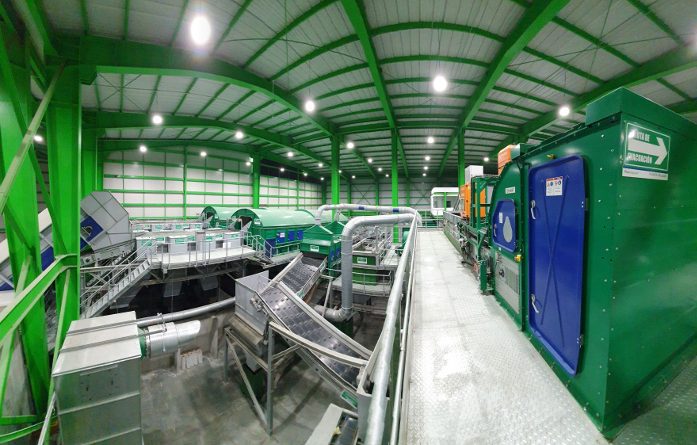The largest sorting plant in Latin America begins operation in Mexico City
The Azcapotzalco Transfer Station and Sorting Plant, the largest and most modern in Latin America, has opened its doors in Mexico City (CDMX). With this facility, the city government is the first in the country to move towards a correct treatment of urban waste based on a circular economy concept – one of the priority objectives of the current administration. Stadler supplied the cutting-edge technology to achieve this milestone.
It is the country’s first government-owned automated plant for the separation and treatment of municipal solid waste. The 11,000m2 facility sorts paper, cardboard, multilayer packaging, PET and HDPE, plastic bags and film, aluminium cans, metallised bags, textiles, glass and other metals. The plant was commissioned in May 2021. It operates in conjunction with a transfer station to process around 1,000 tons per day of waste from the municipalities of Cuauhtémoc, Gustavo A. Madero, Miguel Hidalgo and Azcapotzalco, and will be able to receive up to 1,400 tonnes of waste per day. Its operation will generate 404 jobs.
The facility is run by Pro Ambiente, a subsidiary of Cemex, which has more than 25 years of experience in waste management and in operating plants for the selection and recovery of waste-derived fuels.
The plant was officially inaugurated on Sunday 25 July in an event attended by the most prominent personalities of the political arena, including Claudia Sheinbaum Pardo, Head of Government of CDMX; Jesús Antonio Esteva Medina, Secretary of Works of CDMX; Marina Robles García, head of SEMADET of CDMX; Vidal Llerenas Morales, Mayor of Azcapotzalco; and Gautier Mignot, Ambassador of the EU Delegation in Mexico. The use of mechanical treatment between transfer and final disposal was a fundamental and natural first step in the zero-waste program of Mexico City’s current administration. The objective was to capture and sort all recyclable packaging within the transfer station itself.
Technology focused on the circular economy
The trust that the government has placed in STadler was developed through a bidding process with the participation of academics and experts at national level, as well as institutions and ministries involved in the legislation and oversight of the correct treatment of MSW. The outcome of a detailed analysis by a committee of experts based on a waste characterization carried out by UAM led to the conclusion that Stadler’s technology, “Made in Germany”, but adapted to local needs and tailored to the specific requirements, guarantees a mechanical treatment that meets the highest quality and efficiency standards, and is based on the principles of sustainability and the circular economy.
Stadler is a world leader in MSW plants and is present in Mexico through 4 important recycling projects: in Cuautla de Morelos (OFMRS), in Chihuahua, in San Luis Potosi and now in Azcapotzalco. Three of these projects have been fully completed, and the remaining one, soon to be commissioned, is expected to be a great success in its location.

